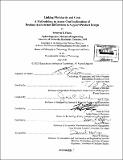Linking modularity and cost : a methodology to assess cost implications of product architecture differences to support product design
Author(s)
Fixson, Sebastian K. (Sebastian Klaus), 1967-
DownloadFull printable version (11.43Mb)
Other Contributors
Massachusetts Institute of Technology. Technology, Management, and Policy Program.
Advisor
Thomas A. Roemer.
Terms of use
Metadata
Show full item recordAbstract
Reaching saturation levels, many markets in modem industrial societies tend to fracture into smaller 'niche' markets, and create a need for greater variety. At the same time, increasing product variety in non-growing markets results in decreasing production volumes per model, which tends to increase costs. Modularity as a design concept has been suggested to be able reconciling these opposing effects. Most descriptions of modularity characterize products through idealized extremes, such as 'modular' versus 'integral.' While conceptually powerful, this notion is very difficult to operationalize. Consequently, it has been very problematic to determine the economic consequences of modularity. This thesis presents a methodology to overcome this problem. The development of the methodology is split into three parts: what is modularity, what costs are considered, and how can the link between the two be established? First, to operationalize modularity, an in-depth analysis of the phenomenon was conducted and an alternative framework developed. The multi-disciplinary analysis revealed that modularity is a bundle of product characteristics rather than an individual feature, and that different disciplines and viewpoints emphasize different elements of this bundle. Consequently, the descriptive product architecture framework developed in this thesis encompasses all dimensions identified in the analysis, but simultaneously enables one to comparatively measure those characteristics along individual dimensions. (cont.) Second, to improve the understanding of the multitude of costs that occur over a product's life, a product life-cycle view has been used to investigate the cost effects of early design decisions with respect to product architecture. In addition, a review of the cost modeling literature identified the gap that exists between some empirical work identifying particular product features' effects on particular costs, and the more general design guidelines such as design-for-manufacturing (DFM) or design-for-assembly (DFA). Finally, the thesis constructed a link between modularity and cost by applying the product architecture framework and technical cost modeling to experimental case studies. Case study subjects were four different car door structures. The case studies demonstrate the cost consequences of individual product architecture dimensions by isolating their effects from competing explanations. Enabling the translation of business goals into focused design advice, the proposed methodology represents a tool to reconnect management and engineering worlds.
Description
Thesis (Ph. D.)--Massachusetts Institute of Technology, Engineering Systems Division, Technology, Management, and Policy Program, 2002. Includes bibliographical references (p. 239-255).
Date issued
2002Department
Massachusetts Institute of Technology. Engineering Systems Division; Technology and Policy ProgramPublisher
Massachusetts Institute of Technology
Keywords
Technology, Management, and Policy Program.